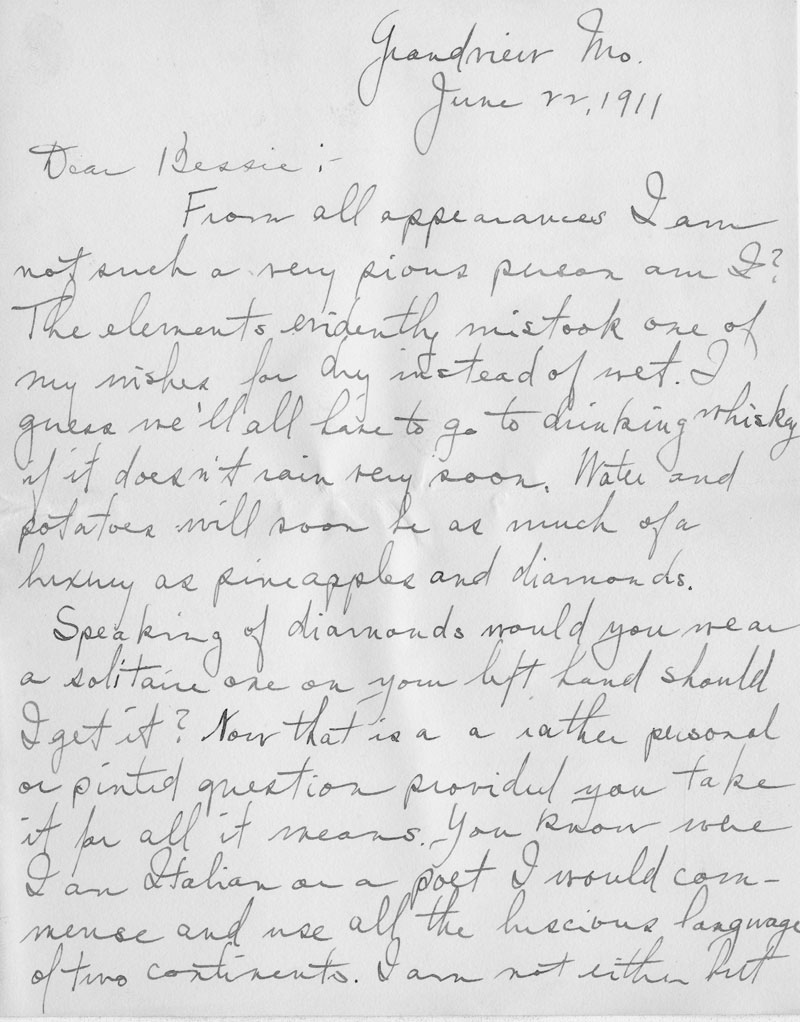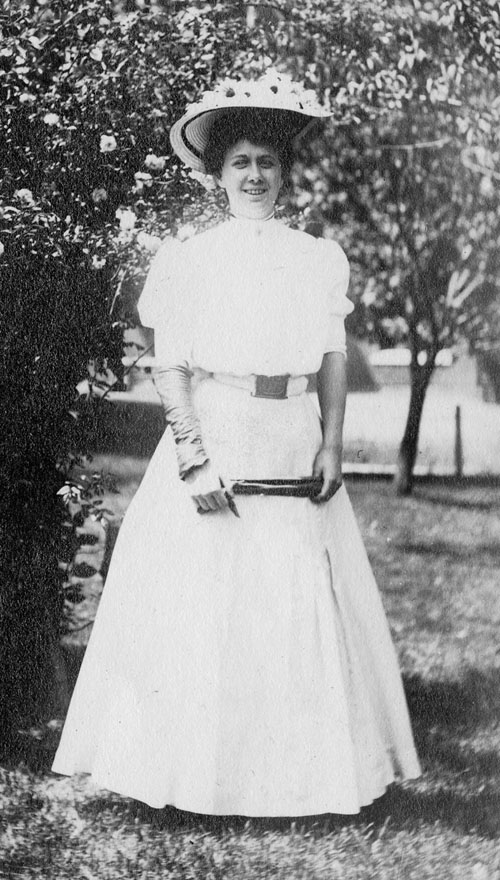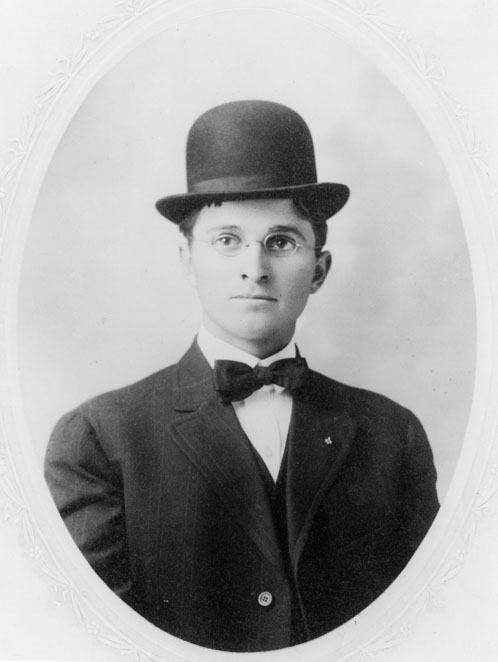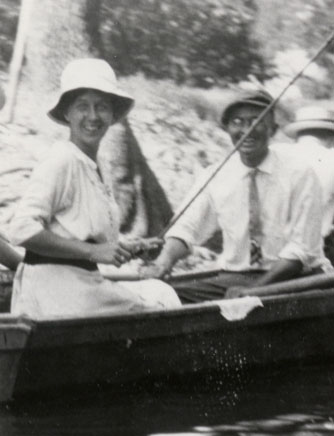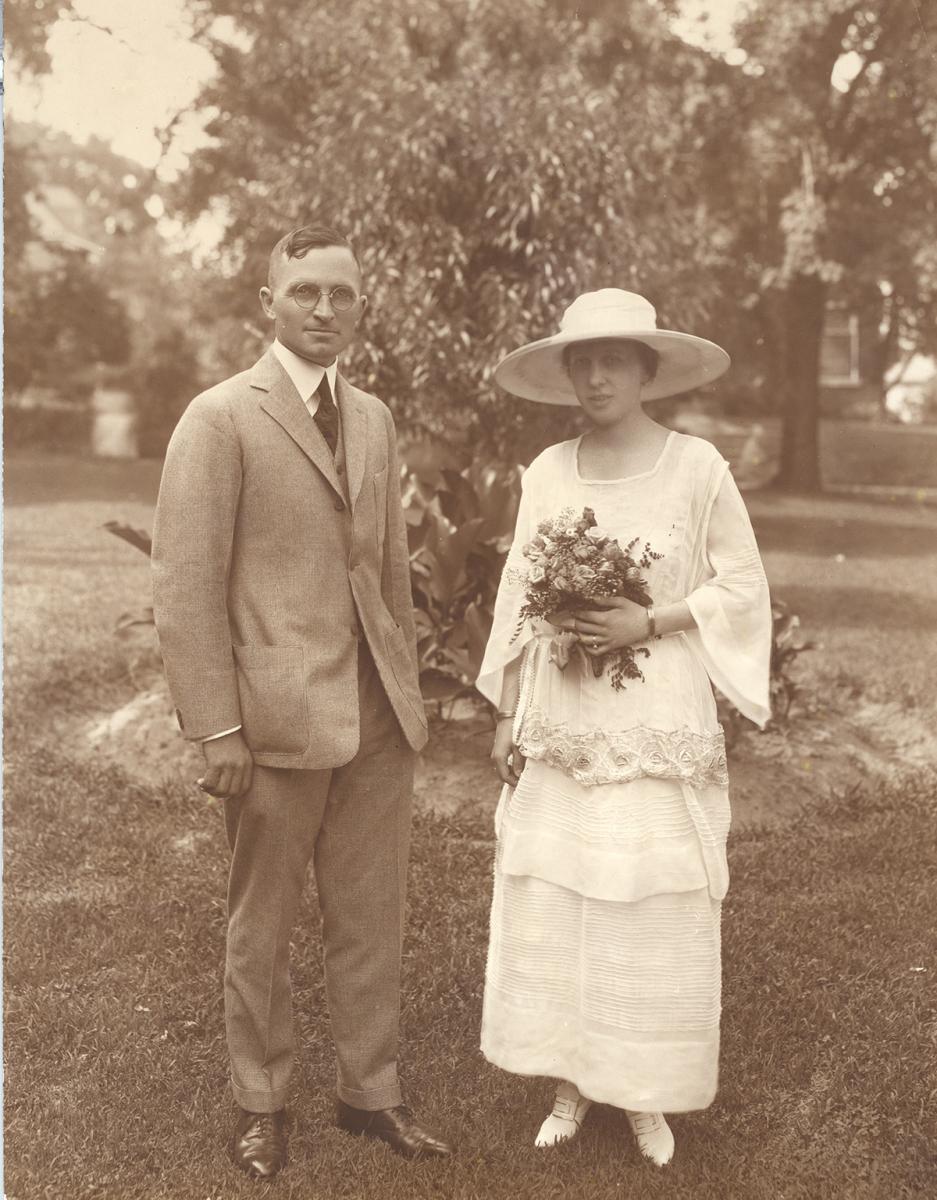
The First Proposal
or,
What a Future President of the United States Did When He Was Rejected by the Woman He Loved
Winter 2007, Vol. 39, No. 4
By Raymond H. Geselbracht
It is hard to imagine Harry S. Truman as President of the United States without his wife, Bess Wallace Truman. She was an important part of his life from the time they first met in Sunday school at the First Presbyterian Church in Independence, Missouri, in 1890. He was six years old; she was five. Harry would go into raptures about this "beautiful curly haired girl . . . the most beautiful girl I ever saw" for the rest of his life.
To the degree that two people can meld together and become one person, Harry Truman and Bess Wallace Truman became one person. If Bess had not been with Harry, his life almost certainly would have taken a different trajectory from the one that eventually brought him to the presidency.
Very likely, without Bess at his side, an intimate part of his life, Harry S. Truman would not have become President of the United States on April 12, 1945, following the death of Franklin D. Roosevelt, and the history of the United States, and arguably of the world, after World War II would have been different, maybe drastically different. Perhaps there would have been no Marshall Plan, no recognition of Israel, no Berlin airlift, no NATO, no defense of South Korea, no determined resistance to Soviet expansionism following the war.
Many years before, when Truman was a farmer with no prospect of notable future success, he had to court Bess Wallace and then win her as his wife in order to enter onto the course of personal history that would take him to the presidency. But Bess was problematic. Maybe she didn't want to be Harry Truman's wife at all, or maybe she wasn't sure of her feelings. In any event, very early in Harry's courtship of Bess, he made a serious mistake that could have ended their relationship.
Harry Truman always said he fell in love with Bess Wallace when they were children in Sunday school together. It was love at first sight, at least in Truman's probably oversimplified recollection in later life of what happened sometime during the 12 years they attended Sunday school. Harry fell deeply and permanently in love with Bess Wallace. He apparently never thought of being attracted to any other girl and never had a date with anyone else. Bess was, as he remembered many years later, "all that a girl could be possibly and impossibly."
The young woman in this love story, though, did not reciprocate Harry Truman's extraordinarily single-minded and ardent feelings. The little bit of evidence of Bess Wallace's early years that survives, most of it photographic, suggests she was a young woman with a pleasing personality who enjoyed some fun. She had a cherished circle of family and friends, and probably had some boyfriends. Maybe she stooped to a little flirting from time to time. One can't imagine Harry Truman engaging in flirtation. This was the young man who said of himself, "I was always afraid of the girls my age and older." Nonetheless, he tried to make friends with Bess when they were in high school together, and she let him walk home with her on occasion. This was all the encouragement she gave him. "I was lucky if I got to carry her books home for her sometimes," Harry remembered.
After Harry and Bess graduated from high school in 1901, they went different ways and probably saw one another seldom, if at all, for the next nine years. Bess's father committed suicide in 1903. She went with her shattered mother and her brothers to live in Colorado for a while, and when they came back to Independence, they moved into her grandparents' home at 219 North Delaware Street. Bess became her fragile and demanding mother's companion, a role she surrendered only when her mother died 50 years later. Harry's family fell on hard times. His father lost almost everything he had in grain speculations. The family moved away from Independence, and Harry went to work in Kansas City. In 1906, he rejoined his family in Grandview, Missouri, to work on the large farm that belonged to his mother's family.
The fragile link that held Harry Truman and Bess Wallace together during these years was the household of Harry's father's sister, Ella Noland, and her family at 216 North Delaware Street, just across the street from Bess's house. It's not known how often Harry visited his aunt, uncle, and cousins at 216 North Delaware Street, and it's not known whether he ever saw Bess during his visits. It seems likely he didn't see her in any meaningful way because of the importance that Truman's biographers have given to something that happened in the summer or fall of 1910. Bess's mother, Madge Wallace, had sent a cake over to the Nolands, and as the cake was now eaten, the plate had to be returned. Harry was visiting, and he volunteered to take the plate over to Bess's house. He knocked on the door and Bess answered. He apparently decided to try again to draw her, the only woman he had ever loved, into a romantic relationship. He probably visited with her a few times over the next several months, and on December 31, 1910, he wrote her the first of what would become a torrent of letters. "If you see fit to let me hear from you sometimes, I shall certainly appreciate it," Harry wrote. She did write back, and Harry wrote her again and again. Very quickly, on Harry's side at least, the visits to Bess and the letter writing became a courtship.
Courting Bess Wallace was not easy for Harry Truman. He was in Grandview, about 20 miles from Independence. He didn't have a car until 1914 and had to rely before that on a cumbersome and sometimes unreliable combination of horse-drawn carriage, trolley, and train to get to Independence. Telephoning, involving operators, party lines, and two different telephone companies, was arduous, and Harry and Bess apparently used the telephone sparingly. Harry would have to rely on his letters to fill in the gaps between the times when he could visit her.
After his first New Year's Eve letter, Harry wrote Bess twice in January 1911, twice in February, and three times in March (assuming all his letters survive). In April, May, and the first part of June he wrote her more often, about once a week. Bess wrote him back, and this thrilled him. "I sincerely hope you won't get disgusted with my excuses for letters," he wrote her on January 26, "for I sure do like to hear from you." He visited Independence several times in early 1911, had dinner with her, played the piano for her mother; he took her to a music concert and a play; he went to church with her. Then he broke his leg on about April 20 and was laid up all through May and walked with difficulty for some time after that. For about two months, he couldn't go to Independence.
He must have thought of Bess a great deal during the long, lonely weeks he was confined to the farmhouse in Grandview. She was 20 miles away; he couldn't see her no matter how much he wanted to. On June 22, he wrote her a letter in which he did something rash. He was too much in love, too eager, and he moved too far too fast. He might have lost Bess because of what he said in this letter.
It's hard to know to what degree this was a premeditated letter. Was Harry waiting for the right opportunity to say what he says in this letter? Having decided that the time was right, the opportunity had come, did he work out the letter in his mind first, then write down the carefully considered words? One would think, given the importance of what he had to say, that this would be the case. But the letter looks almost like a spontaneous flow of words and thoughts. Maybe Harry didn't know what he was going to write until he wrote it.
He opens the letter with talk of the weather. It had been very dry, despite his fervent wish for rain; he'll have to drink whiskey rather than water. "Water and potatoes will soon be as much of a luxury as pineapples and diamonds," he writes. Having maybe by accident written the word "diamonds," he decides to go further with it. "Speaking of diamonds would you wear a solitaire one on your left hand should I get it?" After this, he lets his emotions run loose. "You may not have guessed it but I've been crazy about you ever since we went to Sunday school together. But I never had the nerve to think you'd even look at me. I don't think so now but I can't keep from telling you what I think of you." Bess had told him she was tired of reading love stories in the books they were reading. But Harry had a special interest in one special love story. "I am trying one from real life on you," he writes. "I guess it sounds funny to you but you must bear in mind that this is my first experience in this line and also it is very real to me."
Maybe he sensed his letter had gotten very solemn indeed, and that when Bess read these words, she might be feeling flushed and in a bit of panic. Whatever his reason, he skips away from the deep sincerity of what he had just written and goes back to small talk. He will send her something new to read; his leg is getting better and he can get around on a cane now; he thinks European royalty are a disgrace and he thinks everyone who isn't white should go back where they came from; Bess's brother, if he moves away, should at least go to a southern state.
One wonders what Bess made of all these trifles that followed Harry's offer of a diamond ring and of his heart forever. After she finished reading through Harry's astonishing small talk, she discovered that her boyfriend, having made his bold proposal, expected her to reject him. "Say Bessie you'll at least let me keep on being good friends won't you," he writes plaintively, as if he knows he has gotten himself in trouble. "I know I am not good enough to be any thing more but you don't know how I'd like to be." He asks her to write as soon as she can. "Maybe you think I won't wait for your answer to this in suspense," he says earnestly and teasingly.
Harry waited nine very long days for an answer from Bess. He went through the mail every day when it came in, but found nothing. One can imagine the young man's anxiety and impatience. Finally, probably in despair, he wrote Bess another letter. It's dated July 1, which was a Saturday. He begins with some typical small talk about the books they were reading, and then he asks plaintively, "Did you get a letter from me not long ago? Please answer if only to give me fits for being so fresh."
It's difficult to know Bess's thoughts and emotions when she read this new letter. The only real clue to them is what she didn't do. She didn't write back.
Again Harry watched the mail each day, and day after day he was disappointed. Nothing from Bess. He must have worried that she would never let him see her again. He tried calling her one day when he was in Kansas City but couldn't get through.
On Monday, July 10, he wrote her a very short letter, hardly more than a note. There was no small talk this time. "If being in love with you is any offence I am sorry but it can't be helped you know. Anyway that shouldn't keep you from being real civil anyway." He asks if he can come see her on Saturday evening, July 15. He probably hadn't seen her since he broke his leg on April 20.
Bess finally relented. She probably sent him a letter, or she might have phoned him. If she did send a letter, it hasn't survived—none of her letters from this courtship period have survived. She must have been warm and friendly, though also serious and firm. She told him she would not become engaged to him; she rejected his proposal.
Harry must have been a little stunned. How was he to feel about being rejected? He said when he proposed to Bess that he wasn't good enough for her and expected to be turned down. But now it had actually happened. How was he to react, what would he say to Bess after this, once all his emotions had had a chance to simmer for a while?
Should he jump in the buggy or get on the train or trolley as soon as he could get away and confront Bess in person, let her see how much he loved her, argue how urgent that love was? Maybe she would change her mind. Or maybe he should be angry, that might ease the pain of being rejected. Maybe the best thing to do would be to avoid Bess for a while. If he didn't write or visit her for a time, maybe she would start missing him and regret that she had turned him down. Also, she had ignored him for almost three weeks after he proposed to her; maybe it would feel good to ignore her for just as long, or even longer. Or maybe he should simply give up on Bess Wallace. Maybe he truly was, as he had written in his proposal letter, not good enough for her. Bess lived in one of the finest houses in Independence; her grandfather was one of the town's leading citizens; she was Episcopalian, which was the most prestigious denomination in the small world of Independence society. He was a farmer working a big piece of land that couldn't seem to produce much income; he was a Baptist; he hadn't been able to go to college. Maybe he should try to forget Bess, find a girl nearer home, one that wasn't too good for him.
Harry didn't do any of these things. He didn't run feverishly to confront Bess, he didn't feel angry toward her, he didn't ignore her, and, most emphatically, he didn't give up on her. She was the only woman on earth for him, and he wouldn't indulge any emotions, other than love, that might harm his relationship with her.
He wrote her right away. His letter is dated Wednesday, July 12. It's a long letter—five handwritten pages. Read from a distance of 95 years, by someone who knows how the story came out, this letter appears to be very carefully composed, and also to be a remarkably sensitive exercise in diplomacy. Bess must have opened this letter anxiously. She had avoided a confrontation with this too ardent young man as long as she could. Finally she had answered him, told him she would not become engaged to him. She must have wondered if she would see him any more, if their friendship, or whatever it was, was over.
Harry's letter goes straight to the main question that must have been in Bess's mind: How is this young man going to react to being rejected? "You know that you turned me down so easy that I am almost happy anyway," Harry writes. Bess must have been intrigued, or astonished, by such an ironical response. Perhaps it made her laugh and cry at the same time. Harry goes on: "I never was fool enough to think that a girl like you could ever care for a fellow like me but I couldn't help telling you how I felt. . . . I knew that if ever I got the chance I'd tell you how I felt even if I didn't even get to say another word to you. What makes me feel real good is that you were good enough to answer me seriously and not make fun of me anyway. You know when a fellow tells a girl all his heart and she makes a joke of it I suppose it would be the awfulest feeling in the world." Bess must have felt all the anxiety of her predicament falling away. Such a strange, remarkable, wonderful letter. Maybe she smiled and cried again.
Harry goes on to say what their relationship will be now that the awkwardness caused by his proposal has been swept out of the way. If he had chosen to use a diplomat's language in this very diplomatic letter, he would have said he wasn't ever make love to another girl, but he promises he won't bother her with any talk of love again. "I really never expected any reward for loving you . . . . I am more than glad to be your good friend for that is more than I expected." He will, he says, come see her the coming Saturday, if she doesn't tell him not to, and, he promises, "I'll not put on any hang dog airs but will try to be the same old Harry."
As a way of proving that things were back to the status quo ante, he starts writing about some familiar old subjects—the books he's reading, his views about life, the weather. "Don't you know of some way to make it rain?" he asks. He wants to keep exchanging letters with her. "I hope you will continue your good letters as I really enjoy them and will try to answer them to the best of my ability." He closes the letter with some last thoughts about the big sensitive subject that now shouldn't be talked about any more—except for this one last time! "Although I may sometimes remind you of how I feel toward you I'll try and not bore you to death with it." He may slip from time to time, but Bess needn't worry about that at all. He is her friend, not her lover.
If Bess wrote a letter in response to Harry's July 12 letter, it hasn't survived. She probably didn't write one, because she apparently decided after reading Harry's letter to let him come to see her on Saturday, as he had asked to do. She could have told him she didn't want to see him any longer, that she found it awkward to continue seeing a young man whose proposal she had rejected. She didn't do this, though. She let him come visit her.
Harry's first letter to Bess after their visit together on Saturday, July 15, contains a clue about what Bess said to Harry that day about why she rejected his proposal. The letter was written on Monday, July 17. It's a charming letter, full of anecdotes and wit. Harry says he's been flying a kite and "playing boy" with the son of his cousin Ruth Ragland. He offers Bess a photograph of himself in his National Guard uniform just in case she needs a "rat chaser." He's been to the theater with some of his female relatives, and he almost got tipsy in the car coming home. "I never did know that Independence could boast of so many beer drinking ladies," he explains. He says Bess might not think he was a religious man "if you'd hear me address a cranky mule or an obstreperous calf." He asks her to take him with her to see a ball game the next time the Kansas City Blues are in town.
The letter stays firmly in the friendly category, with no straying into talk of love, with the exception of one brief postscript. After signing his letter with a non-threatening "Sincerely, Harry," he writes a few more words, referring to something Bess must have said when they were together the prior Saturday. "I wish you'd cultivate a heart if as you say you haven't any," he writes. Maybe this was Bess's excuse for refusing him. She had no heart. Maybe this was just a way of hiding her inner feelings, perhaps very conflicted feelings, or maybe it was an oblique way of saying she had no feeling in her heart for him.
The crisis caused by Harry Truman's proposal to Bess Wallace on June 22, 1911, lasted about three weeks. Throughout this time, until she finally responded to Harry's letter, probably on July 11, Bess was silent. One can't know how close she may have been to doing something more drastic and decisive than what she finally did. Did she think about accepting Harry? Did she think about breaking off their relationship? In the end, she decided to allow her relationship with Harry to go back to what it had been before the proposal.This was not entirely possible, though. Something of the mood left by the proposal and its aftermath was still evident six months later. When Harry was visiting with Bess on Sunday, January 21, 1912, he said something awkward. He asked her if she wasn't tired of his "hanging around so long at a time." Bess answered that he was the one who would get tired of this "hanging around." Harry said he'd never get tired of being with her. Bess started to worry that the young man was becoming too ardent and that the forbidden topic of love might come up again. She decided the time was right to start talking about the weather. Maybe it was raining or there were some black clouds around. Whatever the exact reason, she blurted out "Oh heck I wish I had some rubber boots!" Any threat that Harry might say something amorous was over, doused by an abrupt appeal to bad weather and rubber boots.
Thoughts of love had been in his heart, though, and Bess's talk of rubber boots did not exorcise them. He went home thinking about what had happened. Early the next week he sat down at this desk and wrote Bess what he said was "the craziest letter." He couldn't bring himself to send it. He tried a second time to write the right kind of letter, but he didn't like this one either. He tried again, and this time he mailed the letter to Bess. He recounted their conversation the prior Sunday. He thought her "rubber boots" outburst was very funny, but neither of them had laughed. He was glad of this, because he was completely serious when he said he would never be tired of being with her. But he assured her she would never have to worry about him "getting slushy or proposing," at least for the time being. But if he someday made enough money so that he could give her as good a home as she already had at 219 North Delaware Street, then things would be different. "I'd make love to you so hard you'd either have to say yes or knock me on the head." Harry must have startled himself somewhat as he was writing this. This kind of talk was forbidden! "If you don't like that [last] part," he writes, "skip it, which you can't because you won't know it's there." He feels brave now though, and says he won't take anything he's just written back. "It's just what I think and I mean every word of it."
Harry got away with this indiscreet but heartfelt outburst. He and Bess Wallace kept seeing one another and exchanging letters. In November 1913, sitting with Bess on her front porch, Bess told Harry that her feelings about him had changed since she rejected his proposal two and a half years earlier. She said she felt now that if she ever got married, it would be to him. They did not announce their engagement for another four years, and they were not married until June 28, 1919. Harry hadn't made the money he needed to get a house for Bess that was as good as 219 North Delaware Street, but he solved this problem by moving in with her and her mother. Harry and Bess Truman lived together in this house, with absences in Washington, DC, and elsewhere, for 53 years, 5 months, and 28 days.
Bess was so essential to Harry Truman that history might not know his name at all if she had not finally decided to accept him as her husband. Harry's impetuous and apparently unwelcome proposal in June 1911 could have caused his relationship with Bess to be broken off. But Harry was able to recover from his mistake, thanks to some hasty but adept diplomacy, as well as to his remarkable lack of rancor, his self-deprecating sense of humor, his apparent inability to be anything except ingenuous, and his steadfastness of purpose.
Bess did finally accept him, and the fateful chain of events that brought Harry Truman to the presidency fell into place.
Raymond Geselbracht is special assistant to the director of the Harry S. Truman Library in Independence, Missouri. His contributions to Prologue include articles on Truman's relationship with the Marx Brothers, his love of poker, and his schooling in Independence, Missouri.
Note on Sources
Truman's memory that the Bess Wallace whom he got to know in Sunday school was "all that a girl could be possibly and impossibly" is in his letter to Bess, June 11, 1911. His lament about his attempt during his high school years to get to know Bess better, "I was lucky if I got to carry her books home for her sometimes," is in his memorandum in the "Pickwick Papers," May 1931. The several quotations in the two paragraphs beginning "This was not entirely possible . . ." and "Thoughts of love had been in his heart . . ." are in Truman's letter to Bess, January 25, 1912. Other documents that are quoted are cited in the text. Truman's statement about himself, "I was always afraid of the girls my age and older," is in Memoirs of Harry S. Truman: Year of Decisions (Garden City, NY: Doubleday & Company, Inc., 1955), p. 115. The description of Bess's feelings during her intimate talk with Harry in November 1913 is from Margaret Truman, Bess W. Truman (New York: MacMillan Publishing Company, 1986), p. 48. Truman's letters to Bess Wallace Truman and his "Pickwick Papers" memorandums are in the Papers of Harry S. Truman at the Truman Library in Independence, Missouri. The historic photographs that illustrate this article are also in the Truman Library's holdings.
